Dirt Contractors Dayton
Top Dirt Contractors in Dayton
Get multiple Dirt Removal quotes for your project today! Compare profiles, reviews, accreditations, portfolio, etc... and choose the best deal.
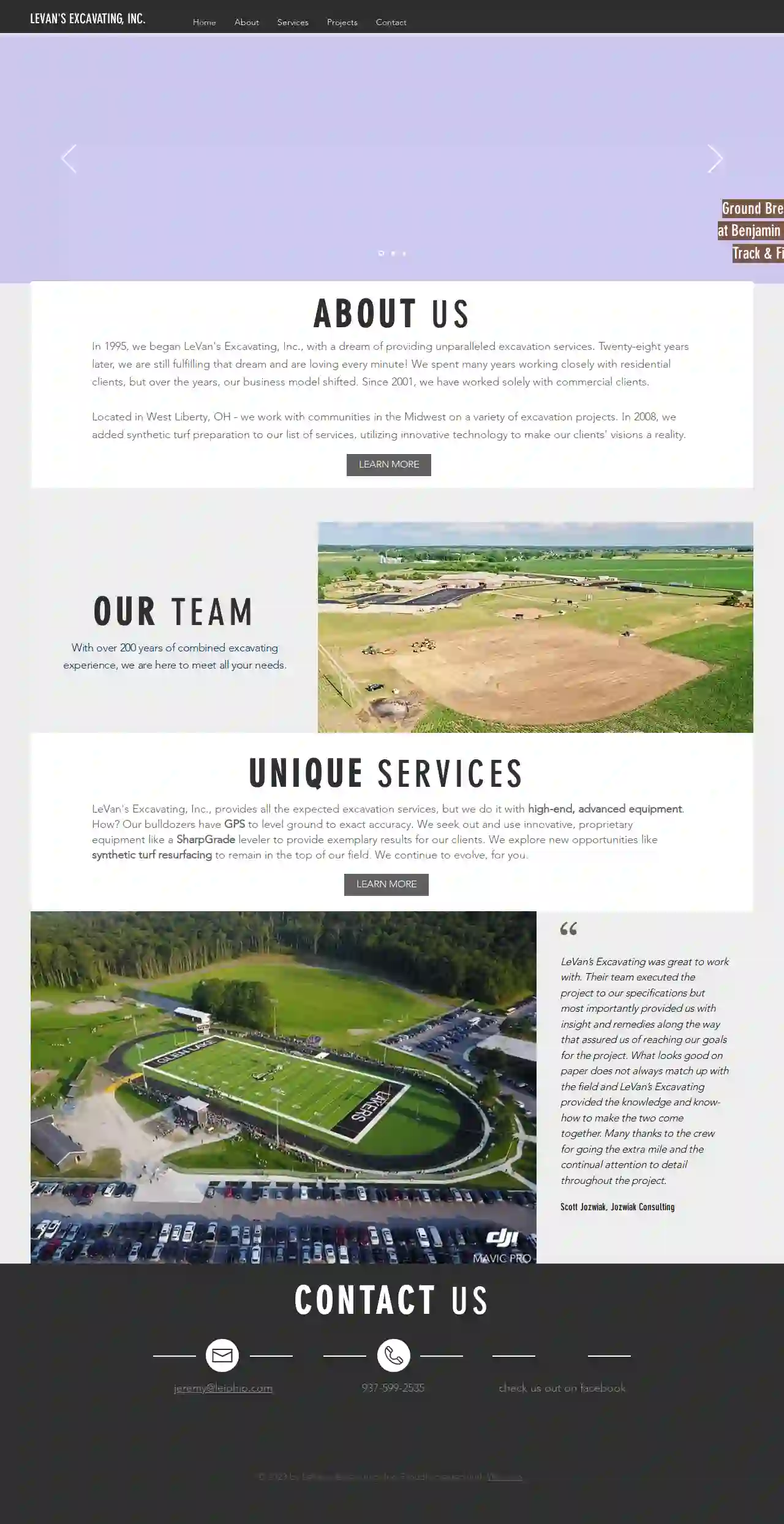
LeVan's Excavating, Inc.
54 reviewsDayton, USGround Breaking at Benjamin Logan Track & Field In 1995, we began LeVan's Excavating, Inc., with a dream of providing unparalleled excavation services. Twenty-eight years later, we are still fulfilling that dream and are loving every minute! We spent many years working closely with residential clients, but over the years, our business model shifted. Since 2001, we have worked solely with commercial clients. Located in West Liberty, OH - we work with communities in the Midwest on a variety of excavation projects. In 2008, we added synthetic turf preparation to our list of services, utilizing innovative technology to make our clients' visions a reality. About Our Team With over 200 years of combined excavating experience, we are here to meet all your needs. Unique Services LeVan's Excavating, Inc., provides all the expected excavation services, but we do it with high-end, advanced equipment. How? Our bulldozers have GPS to level ground to exact accuracy. We seek out and use innovative, proprietary equipment like a SharpGrade leveler to provide exemplary results for our clients. We explore new opportunities like synthetic turf resurfacing to remain in the top of our field. We continue to evolve, for you.
- Services
- Why Us?
- Testimonials
- Gallery
Get Quote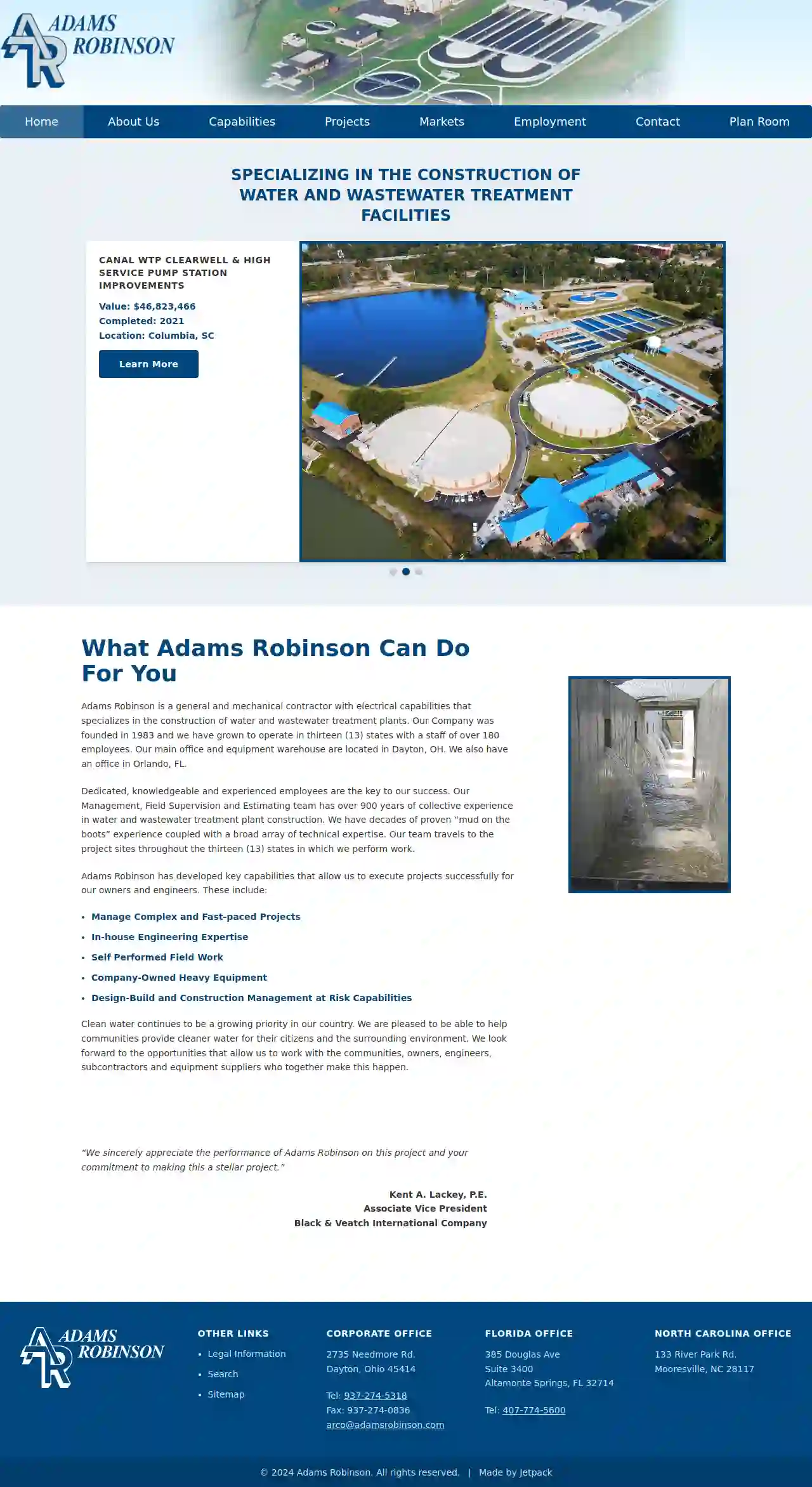
Adams Robinson
4.52 reviews2735 Needmore Rd., Dayton, 45414, USWhat Adams Robinson Can Do For You Adams Robinson is a general and mechanical contractor with electrical capabilities that specializes in the construction of water and wastewater treatment plants. Our Company was founded in 1983 and we have grown to operate in thirteen (13) states with a staff of over 180 employees. Our main office and equipment warehouse are located in Dayton, OH. We also have an office in Orlando, FL. Dedicated, knowledgeable and experienced employees are the key to our success. Our Management, Field Supervision and Estimating team has over 900 years of collective experience in water and wastewater treatment plant construction. We have decades of proven “mud on the boots” experience coupled with a broad array of technical expertise. Our team travels to the project sites throughout the thirteen (13) states in which we perform work. Adams Robinson has developed key capabilities that allow us to execute projects successfully for our owners and engineers. These include: Manage Complex and Fast-paced Projects In-house Engineering Expertise Self Performed Field Work Company-Owned Heavy Equipment Design-Build and Construction Management at Risk Capabilities Clean water continues to be a growing priority in our country. We are pleased to be able to help communities provide cleaner water for their citizens and the surrounding environment. We look forward to the opportunities that allow us to work with the communities, owners, engineers, subcontractors and equipment suppliers who together make this happen. “I would highly recommend Adams Robinson Enterprises, Inc. for your project.” Alper Aksit, M.S., P.E.Project Manager / Senior Civil EngineerDavis & Floyd, Inc.
- Services
- Why Us?
- Testimonials
- Gallery
Get Quote
AM Excavating
1Dayton, US- Services
- Why Us?
Get Quote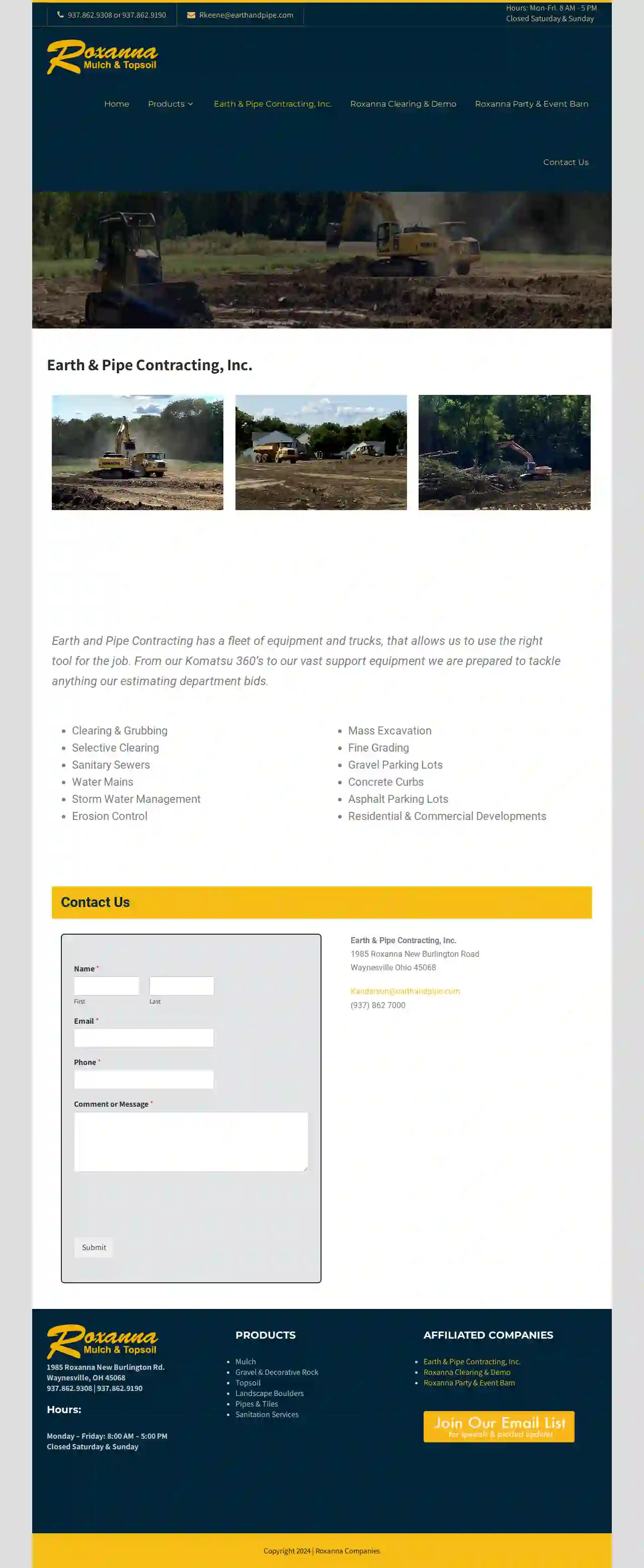
Earth & Pipe Contracting Inc
57 reviews1985 Roxanna New Burlington Road, Waynesville, 45068, USEarth & Pipe Contracting, Inc. Earth and Pipe Contracting has a fleet of equipment and trucks, that allows us to use the right tool for the job. From our Komatsu 360’s to our vast support equipment we are prepared to tackle anything our estimating department bids. Services Offered Clearing & Grubbing Selective Clearing Sanitary Sewers Water Mains Storm Water Management Erosion Control Mass Excavation Fine Grading Gravel Parking Lots Concrete Curbs Asphalt Parking Lots Residential & Commercial Developments
- Services
- Why Us?
- Gallery
Get Quote- Fa
Favorite Excavation & Piping
4.25 reviewsDayton, US- Services
- Why Us?
- Gallery
Get Quote 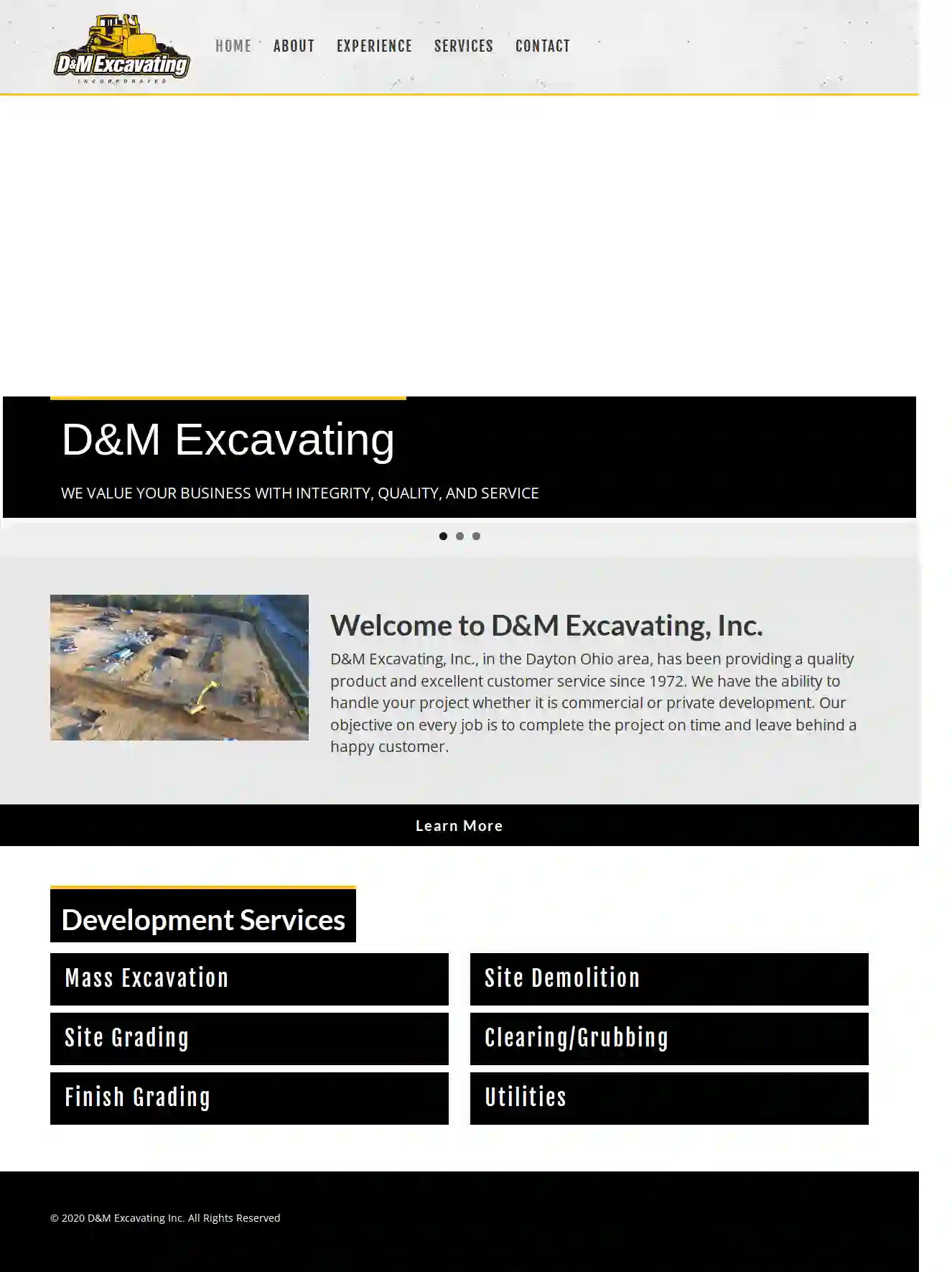
D & M Excavating Inc
4.47 reviews9465 State Route 202, Tipp City, 45371, USAbout D&M Excavating, Inc. D&M Excavating, Inc., serving the Dayton Ohio area, has been providing quality products and excellent customer service since 1972. We have the expertise to handle your project, whether it's commercial or private development. Our commitment on every job is to complete the project on time and leave behind a happy customer. D&M Excavating, Inc. has been in business for over 40 years. During this time, we have worked primarily in the Miami Valley on a large variety of projects for many customers while maintaining relationships with several repeat customers. We are large enough to handle most any project but remain small enough that our owners get to each job daily to check on progress and resolve any problems that may arise. We recognize that leaving the job with a satisfied client is the only way to remain in business. Our many repeat customers are proof of the good impression we leave after every job.
- Services
- Why Us?
- Gallery
Get Quote
Charles F. Jergens Construction
51 reviews1280 Brandt Pike, Dayton, 45404, USCharles F. Jergens Construction, Inc. A family-owned and operated business with over 50 years of experience, Charles F. Jergens Construction, Inc. is a leading demolition and site work contractor in Dayton, Ohio. We provide excavation and commercial site work services to construction companies as well as local, state, and federal transportation agencies across the United States. Our team is dedicated to providing quality services that meet the needs of our clients on time and within budget. We take pride in our professionalism and commitment to safety, ensuring that every project is completed to the highest standards. Whether you need demolition, site work, or a combination of both, we have the experience and expertise to handle your project from start to finish. We are committed to providing our clients with the best possible service and results.
- Services
- Why Us?
- Our Team
- Gallery
Get Quote
Dayton Ditch & Drainage
4.962 reviewsDayton, USDayton Ditch & Drainage: Your Trusted Drainage Experts in the Greater Dayton Area Dayton Ditch & Drainage is a locally owned and operated company dedicated to providing exceptional drainage solutions for both residential and commercial properties in the Greater Dayton Metropolitan Area. Our team of experienced professionals has been serving the Miami County area for years, building a reputation for quality workmanship, affordability, and customer satisfaction. We understand the frustration and inconvenience that water damage can cause. Whether you're dealing with basement flooding, landscaping erosion, or persistent water pooling, we have the expertise and resources to address your drainage needs effectively. Our founder, Brian Lambert, brings over three decades of experience in the commercial drainage installation industry. This wealth of knowledge allows us to provide tailored solutions that meet your specific requirements and budget. At Dayton Ditch & Drainage, we are committed to: • Providing comprehensive drainage assessments to identify the root cause of your issues. • Offering a wide range of drainage solutions, including French drains, sump pumps, catch basins, and more. • Utilizing high-quality materials and proven installation techniques to ensure lasting results. • Delivering prompt and professional service, keeping you informed throughout the entire process. • Offering competitive pricing and flexible financing options to make our services accessible to all. We are proud to be a trusted partner for homeowners and businesses in the Dayton area. Our commitment to excellence has earned us numerous positive testimonials from satisfied clients. We invite you to explore our website and learn more about our services. Contact us today for a free consultation and let us help you reclaim your property from the damaging effects of water.
- Services
- Why Us?
- Testimonials
- Gallery
Get Quote- Ke
Keighley Excavating
51 reviewsDayton, US- Services
- Why Us?
- Gallery
Get Quote 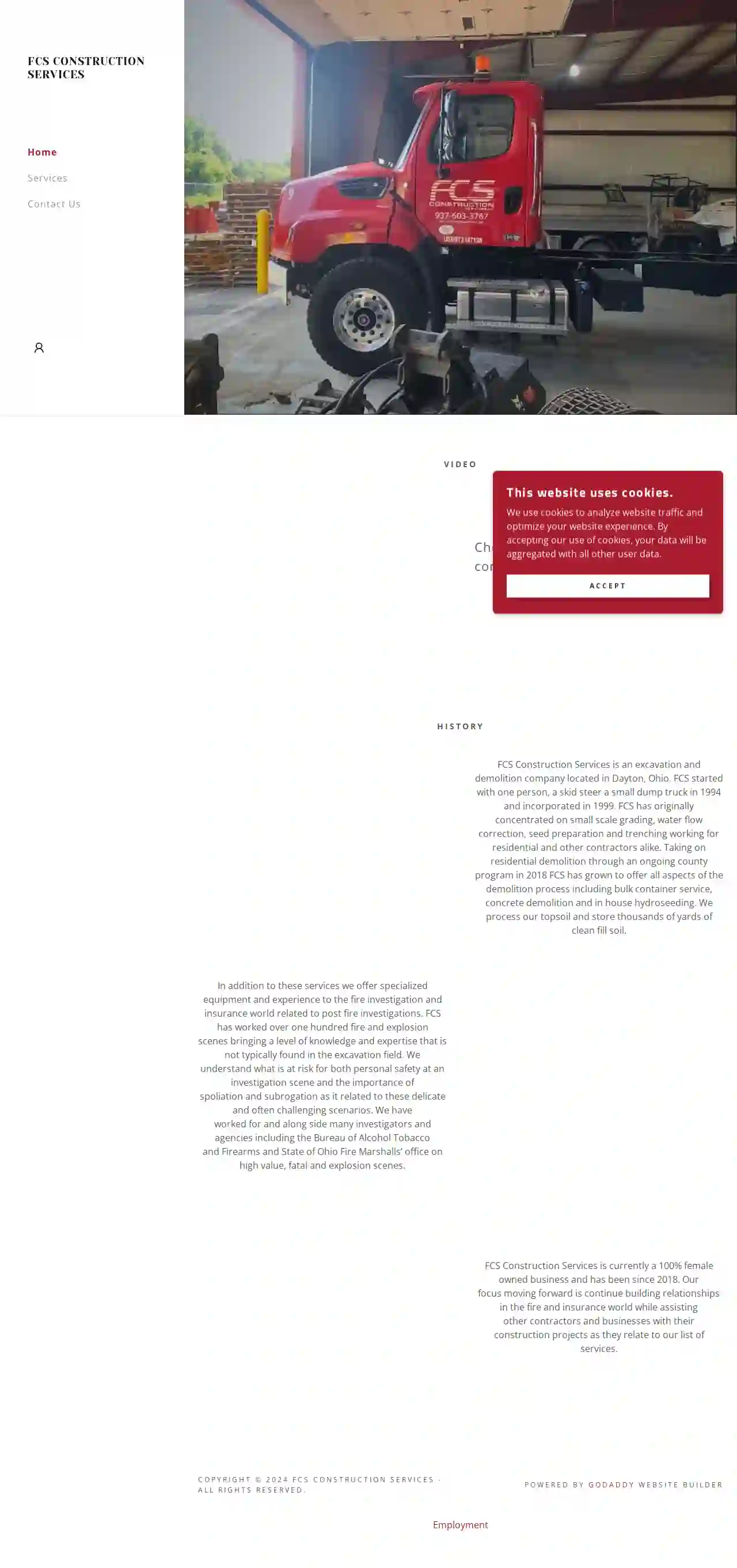
FCS Construction Services Inc
51 reviewsDayton, US- Services
- Why Us?
Get Quote
Over 3,943+ Excavation Contractors registered
Our excavation pros operate in Dayton and surrounding areas!
ExcavationHQ has curated and vetted Top Excavation Contractors in Dayton. Find the most reliable business today.
Frequently Asked Questions About Dirt Contractors
- Efficiently Spread and Level Dirt: Using specialized equipment like bobcats or skid steers to ensure even distribution and proper compaction.
- Achieve Precise Grading: Following specific grades and contours for drainage or construction purposes.
- Handle Large Volumes of Dirt: Managing large deliveries and removals with dump trucks and other heavy machinery.
- Minimize Risks and Ensure Safety: Working safely and efficiently, reducing the potential for injuries or property damage.
- Dirt Removal: Excavating and hauling away excess dirt or soil from construction sites, landscaping projects, or other areas.
- Dirt Delivery: Transporting and delivering various types of dirt, such as topsoil, fill dirt, sand, or gravel, for construction, landscaping, or gardening purposes.
- Grading: Leveling or sloping land to achieve specific contours for drainage, landscaping, or construction projects.
- Excavation: Digging trenches, foundations, basements, pools, or other structures requiring earthmoving.
- Land Clearing: Removing trees, vegetation, and debris to prepare land for development or other uses.
- Site Preparation: A combination of services, including clearing, grading, and compaction, to prepare a site for construction or landscaping.
- Clean Fill: Consists of uncontaminated soil, rock, or gravel, free from organic matter, debris, or hazardous substances. Suitable for most construction and landscaping projects.
- Structural Fill: A compacted granular fill, typically gravel, crushed stone, or a mixture of both, used for structural support and drainage. Ideal for foundations, roadways, and retaining walls.
- Engineered Fill: A specifically designed and blended soil mix with controlled properties, such as compaction, drainage, or bearing capacity, tailored for particular applications.
- Unsuitable Fill: Materials like topsoil, organic matter, or contaminated soil that are not suitable for structural fill due to their potential for decomposition, settlement, or environmental concerns.
- For Structural Fill: Use compacted granular fill, such as gravel or crushed stone, for stability and drainage. Avoid using organic materials like topsoil or wood chips, as they decompose and can create voids over time.
- For Landscaping: If you plan to plant in the filled area, use a blend of topsoil and fill dirt. This provides a balance of fertility and structure. Amend the soil with compost or other organic matter to enhance its drainage and nutrient content.
- For Drainage: If the hole is intended for drainage, use a layer of gravel or crushed stone at the bottom to improve water flow. Then, backfill with a porous soil mix that allows water to percolate through.
Can I spread dirt myself, or should I hire a professional?
What services do dirt contractors provide?
What are the different types of fill dirt?
What type of dirt is best for filling a hole?
Can I spread dirt myself, or should I hire a professional?
- Efficiently Spread and Level Dirt: Using specialized equipment like bobcats or skid steers to ensure even distribution and proper compaction.
- Achieve Precise Grading: Following specific grades and contours for drainage or construction purposes.
- Handle Large Volumes of Dirt: Managing large deliveries and removals with dump trucks and other heavy machinery.
- Minimize Risks and Ensure Safety: Working safely and efficiently, reducing the potential for injuries or property damage.
What services do dirt contractors provide?
- Dirt Removal: Excavating and hauling away excess dirt or soil from construction sites, landscaping projects, or other areas.
- Dirt Delivery: Transporting and delivering various types of dirt, such as topsoil, fill dirt, sand, or gravel, for construction, landscaping, or gardening purposes.
- Grading: Leveling or sloping land to achieve specific contours for drainage, landscaping, or construction projects.
- Excavation: Digging trenches, foundations, basements, pools, or other structures requiring earthmoving.
- Land Clearing: Removing trees, vegetation, and debris to prepare land for development or other uses.
- Site Preparation: A combination of services, including clearing, grading, and compaction, to prepare a site for construction or landscaping.
What are the different types of fill dirt?
- Clean Fill: Consists of uncontaminated soil, rock, or gravel, free from organic matter, debris, or hazardous substances. Suitable for most construction and landscaping projects.
- Structural Fill: A compacted granular fill, typically gravel, crushed stone, or a mixture of both, used for structural support and drainage. Ideal for foundations, roadways, and retaining walls.
- Engineered Fill: A specifically designed and blended soil mix with controlled properties, such as compaction, drainage, or bearing capacity, tailored for particular applications.
- Unsuitable Fill: Materials like topsoil, organic matter, or contaminated soil that are not suitable for structural fill due to their potential for decomposition, settlement, or environmental concerns.
What type of dirt is best for filling a hole?
- For Structural Fill: Use compacted granular fill, such as gravel or crushed stone, for stability and drainage. Avoid using organic materials like topsoil or wood chips, as they decompose and can create voids over time.
- For Landscaping: If you plan to plant in the filled area, use a blend of topsoil and fill dirt. This provides a balance of fertility and structure. Amend the soil with compost or other organic matter to enhance its drainage and nutrient content.
- For Drainage: If the hole is intended for drainage, use a layer of gravel or crushed stone at the bottom to improve water flow. Then, backfill with a porous soil mix that allows water to percolate through.